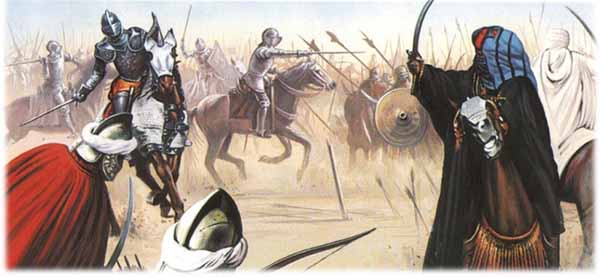Did King Sebastian Die At The Battle of Three Kings ?

On June 11, 1557, the old King of Portugal, John III of Aviz, passed away. Of all his sons, only Sebastian, aged 3, survived. On him now rest the hopes of a country increasingly threatened by Castilian expansion.
A reconquest in the name of God
Sebastian is the latest representative of an illustrious lineage struck by premature deaths possibly due to consanguineous marriages. While his aunt Catherine of Austria ensured the regency of the kingdom of Portugal until his majority (13 years), his uncle, Cardinal Henry, entrusted his education to the Jesuits. When, in 1568, the young man came to power, the weight of this religious training was evident. Sebastian, of melancholy temperament, quickly worries those around him.
Haunted by strange mystical and religious visions, the new king refuses marriage, essential to perpetuate a dynasty of which he is the last descendant. As "envoy of God and monk-soldier", he intends to reconnect with the Portuguese tradition of fighting against Morocco, in the spirit of the Crusades.
Sebastian's desire to attack Islam is in keeping with the spirit of the time: a strong Messianic current has imposed itself since the turn of the century, the time has come for the persecution of Judaism and the aspirations of universal conquest. Prophetic texts are circulating everywhere. Among the most extraordinary, the stanzas of the cobbler Bandarra prophesy of the coming of a sovereign, creator of the empire of God on earth.
A comet for a massacre
On November 10, 1577, a comet crossed the sky of Lisbon in a southerly direction, towards Morocco. Considering this apparition as a heavenly sign, King Sebastian decides to launch the conquest: he wants to subjugate the Moors and convert them to Christianity. The decisive battle took place on August 4, 1578 ...
The Portuguese are crushed in the plain of Alcácer Quibir. The best of the Portuguese nobility lost their lives during this terrible battle (Battle of Three Kings), or were reduced to slavery. The king himself disappears during the carnage.
News of the catastrophe throws the country into consternation: Portugal has lost its king, its army and the elite of its aristocracy. The old Cardinal Henry, Sebastian's uncle, reigned for two years but could not, of course, ensure his succession. Upon his death in 1580, Philip II of Spain captured Portugal.
A masked and cloistered king?
However, voices are raised which question the death of the young king. The corpse identified after the battle as being that of Sebastian presents a swollen face, torn apart and already worn by decomposition. A rumor soon spread: on the evening of the defeat, four knights would have presented themselves at the gates of the Portuguese stronghold of Asilah. One of them was carefully hooded and could be the missing king.
In support of this thesis, it is said that, during the winter of 1578, Dr. Mendès Pacheco, Sebastian's doctor, called to a distant hermitage, would have treated a young man in mask, living withdrawn from the world. Was it King Sebastian, voluntary exiled to expiate the madness that prompted him to sacrifice the future of his kingdom? There are many who want to believe in his return.
The Sebastianists in search of a king
The Sebastianists: this is the name of those who interpret events and prophecies as announcing the return of the young king. However, very quickly, false Sebastians appear. The phenomenon spreads especially in the countryside, where young people pretending to be him organize real princely courts around them. But the phenomenon is not limited to the emergence of a few "peasantry" Sebastians. Certain impostures, like that of 1598, remain famous.
The pretender of Venice
Its theater is Venice. In June 1598, a young man claimed to be the missing king, returning from a long journey of penance. The Sebastianist circles ignite for his cause and manage to free him from the Venetian jails in which the Spanish ambassador had him locked up. Subject to questioning, he answers with sagacity. The Portuguese in exile, more and more, believe that they have found their king. But, while the suitor crosses Tuscany, the authorities of Florence deliver him to the Spaniards. He is taken to Naples, where the viceroy, the Count of Lemnos, interrogates him again.
Sentenced to the galleys, he succeeded in obtaining marks of deference worthy of a sovereign. But he also impresses great Spanish figures, such as the Duke of Medina Sidonia. King Philip III finally decides to subject him to the question, that is to say torture. This one makes him confess to be an impostor: one then cuts off his right wrist, then one hangs him. The adventure serves as a lesson for potential suitors and no one takes a chance.









































































































































































































































































































































